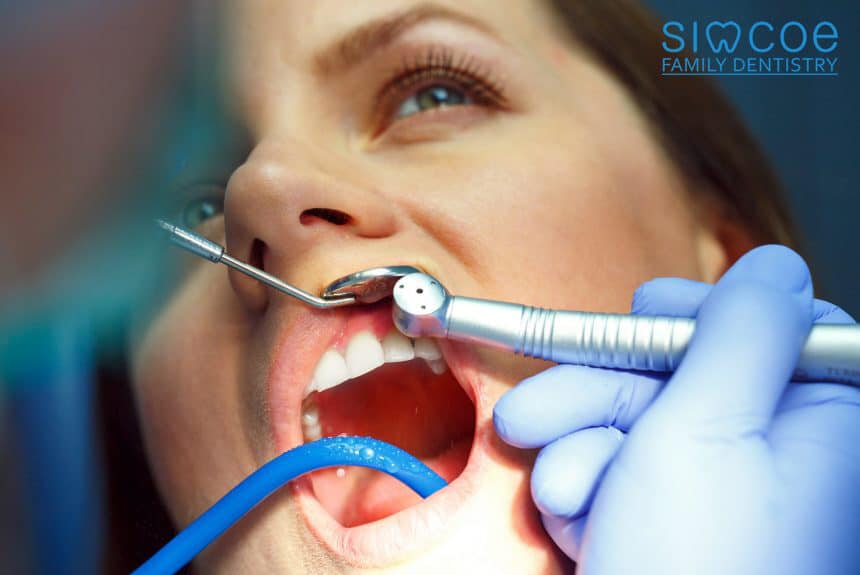According to the Oral Cancer Foundation, around 57,000 people are diagnosed with it every year. It leads to around 10,000 deaths annually, killing around one person per hour. And the survival rate of patients who are diagnosed with oral cancer after five years is only 50%.
Keeping these figures in mind, it is vital to take preventative measures to avoid the disease. The earlier cancer is detected, the better the chances of survival and treating it successfully. However, unfortunately, the early stages of the disease are hard for people to detect themselves. That is why it is recommended to schedule dental visits at least twice a year. Your dentist in Barrie will not only help you avoid teeth and gum problems but also act as your first line of defense against serious health issues, including oral cancer.
So, what is oral cancer?
Oral or mouth cancer is a chronic disease in which a tumour develops in an area of the mouth. It can be on the surface of tongues, inside the cheeks, lips, gums, or on the palate. Tumours in saliva-producing glands – pharynx is also considered oral cancer. It can be life-threatening if left untreated. That is why cancer screening is a vital part of your dental checkup.
What are the signs?
While the symptoms of the disease may vary from one person to another, the most common symptoms of oral cancer include:
- Swelling, lumps, rough spots on the lips, gums, or other areas inside the mouth.
- Development of white, red, speckled patches in the mouth
- Unexplained bleeding, numbness, pain in different areas of the mouth
- Persistent mouth sores or ulcers on the face, throat, or mouth that don’t heal within 2-3 weeks
- Difficulty in chewing or swallowing, talking or speaking, moving your tongue
- Dramatic weight loss
What causes it?
Smoking or chewing tobacco is the most common reason that it develops. However, excessive drinking of alcohol can also cause oral cancer. While alcohol is less potent than tobacco in causing oral cancer, the risks of developing oral cancer are high, especially when you combine alcohol and tobacco.
Apart from this, a family history of cancer, excessive exposure to the sun, and poor dietary habits can also cause cancer. In addition, oral cancer can also result from a sexually transmitted infection, known as human papillomavirus (HPV).
What happens during a dental cancer screening?
A dentist in Barrie will ask you about your medical history to know whether you have been diagnosed with any disease or taking any new medications or not. In addition, your dentist will ask you about the quantity of alcohol or tobacco you consume daily, as people who smoke or drink in excess are at high risk of developing oral cancer.
Your dentist will also want to know about your overall health, including dental issues. So, don’t hide anything and hesitate to ask the questions you have. Now your dentist will perform a dental checkup while examining your teeth, gums, lips, cheeks, tongue, palate, and other areas of your mouth.
If your dentist finds anything suspicious, such as a lesion, they may ask you to come back once or twice a week for another examination. And then, you may have to undergo a biopsy to confirm suspicions about oral cancer. It is crucial to work closely with your Barrie dentist and act quickly if you have oral cancer.
What are the limitations of screening?
Many people can have sores in their mouth that can be non cancerous. And an oral cancer screening can’t identify which sores are cancerous and which are not. At times, if your dentist finds an unusual sore, you may have to undergo further testing.
How will my dentist help prevent it?
Well, a dentist won’t be able to tell you if you have it or not just by doing a regular dental checkup. However, they can help you identify the signs of the disease. They will examine both inside and outside your mouth and keep an eye on the things that might seem concerning. Early diagnosis of cancer enhances the chances of survival. That is why it is vital to schedule a dental visit every six months.
The Bottom Line
While it is crucial to get diagnosed as early as possible, you must undergo screening tests frequently, no matter whether you have any symptoms of the disease or not. Not only will this help you identify oral cancer symptoms at an early stage but also offer you peace of mind. So, choose a dentist who performs oral screening every time you visit for a regular checkup.
If you are searching – the best emergency dentist near you, you can rely on Simcoe Family Dentistry. For more information, contact our experts now!




